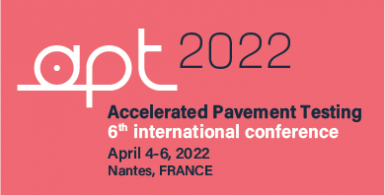Mainly involved in the scientific committee of the APT2020 topic 4 "APT for Airfield pavements", the STAC is supporting the 6th international conference on Accelerated Pavement Testing (APT2020) organized by IFSTTAR in Nantes (France) on next April 4-6, 2022 . Visit www.apt2020.sciencesconf.org for more information.
Member of the scientific and technical network (RST) of the Ministries of Ecological and Solidarity Transition and Territorial Cohesion, the STAC takes an active part in the research, development and innovation actions relating to aeronautical pavements. By doing this, the service takes part in the adaptation of the technical innovations of the road sector to the airport environment and contributes the continual improvement of the technical and legal framework, enabling safe and sustainable development of transport.
1.Accompaniment of the innovation
Active member of the RST where it represents the DGAC, the STAC is closely related to certain laboratories of the IFSTTAR [url : http://www.ifsttar.fr/], of the CEREMA [url : http:// www.cerema.fr/] and of the ENTPE [url : https://www.entpe.fr/] which enables it to follow and support research in the road sector when this engenders innovations applicable to air transport.
The STAC is also a member of the Roads and Streets Innovation Committee (CIRR), ministerial structure that supports road innovation. It integrates aeronautical concerns in calls for projects, participates in bid analysis, and supports the CEREMA in the monitoring of the innovations adopted when they concern the airport environment. It is also a member of the steering committee for applied research into civil engineering.
Finally, the service maintains relationships with the technical departments of the French industrial fabric by means of collective organizations (IDRRIM, USIRF, SPECBEA…).
2.Test infrastructures
The STAC has several test infrastructures enabling implementation of trials for study and research purposes. The Bonneuil-sur-Marne instrumented test sheet, inaugurated in 2012, is used in particular as a reference structure and as a site for mechanical tests and material checks (deflectometers, georadars, etc.). More recently, a second test sheet was implemented at the Road Experimentation Centre (CER) in Rouen to test the influence of the different parameters on the mechanical behaviour of flexible pavement structures. As far as grip is concerned, the STAC enjoys use of the slide surface of the IFSTTAR, in Nantes.
3.Research operations
The STAC participates in a wide range of research operations, which it can either do itself, or pilot in partnership with other road and/or airport stakeholders. In the bearing capacity field, we can mention:
- The dimensioning and auscultation of rigid pavements, which include a doctoral thesis started in late 2016 with the University of Limoges.
- The improvement of the mechanical flexible pavement models, including a thesis launched in 2017 with the ENTPE for a visco-elastic modelling of the auscultations in the HWD, and trials in progress with the CEREMA, Airbus and Toulouse Blagnac airport, to understand new degradation by new downward cracking phenomena.
In adherence matters, the main recent research operations have been:
- The development of a physical model to predict the braking performances of aircraft based on friction measurements with IMAG equipment, which was the doctoral thesis presented in September 2017.
- The development of a tool predicting water heights on a runway in function of the rainfall and surface geometry.
The STAC has also contributed to the European multi-modal projects FOX (Forever open infrastructure across all transport modes) and USE-IT (Users, safety, security and energy in transport infrastructure), and to the Future Sky Safety research programme.
Finally, the STAC has contributed to a collaborative project with the CEREMA and IFSTTAR on heated and energy-recovering pavements, which has enabled it to build a heated pavement in Égletons. This project was rewarded in 2016 with a CEREMA innovation prize.
Updated on Nov 10 2022

